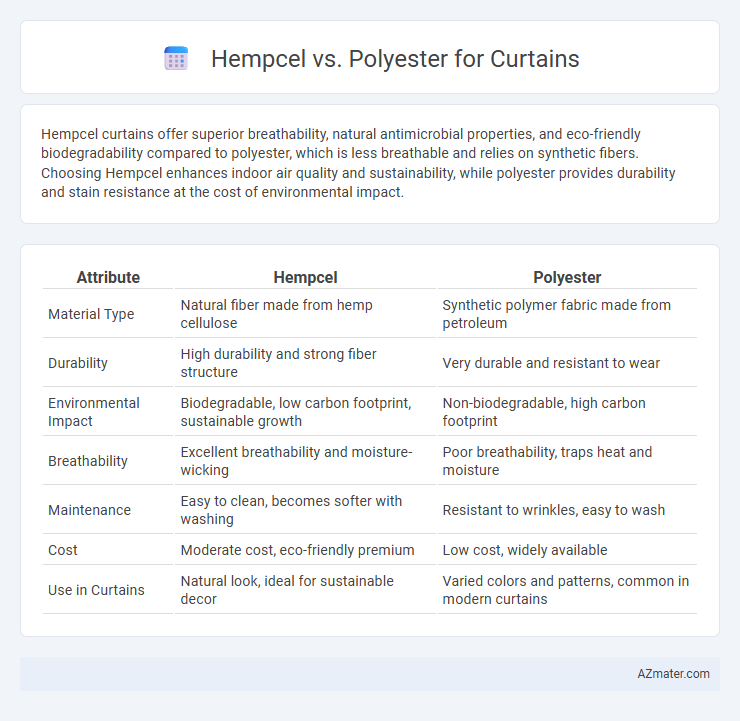Hempcel curtains offer superior breathability, natural antimicrobial properties, and eco-friendly biodegradability compared to polyester, which is less breathable and relies on synthetic fibers. Choosing Hempcel enhances indoor air quality and sustainability, while polyester provides durability and stain resistance at the cost of environmental impact.
Table of Comparison
| Attribute | Hempcel | Polyester |
|---|---|---|
| Material Type | Natural fiber made from hemp cellulose | Synthetic polymer fabric made from petroleum |
| Durability | High durability and strong fiber structure | Very durable and resistant to wear |
| Environmental Impact | Biodegradable, low carbon footprint, sustainable growth | Non-biodegradable, high carbon footprint |
| Breathability | Excellent breathability and moisture-wicking | Poor breathability, traps heat and moisture |
| Maintenance | Easy to clean, becomes softer with washing | Resistant to wrinkles, easy to wash |
| Cost | Moderate cost, eco-friendly premium | Low cost, widely available |
| Use in Curtains | Natural look, ideal for sustainable decor | Varied colors and patterns, common in modern curtains |
Introduction to Hempcel and Polyester Curtains
Hempcel curtains are made from natural hemp fibers combined with cellulose, offering eco-friendly, breathable, and durable window treatments that resist mildew and UV damage. Polyester curtains, derived from synthetic polymers, provide affordable, wrinkle-resistant, and low-maintenance solutions with a wide range of colors and patterns. Choosing between Hempcel and polyester depends on preferences for sustainability, texture, and durability in curtain materials.
Material Composition and Sources
Hempcel curtains are made from natural hemp fibers combined with recycled cellulose, creating an eco-friendly, biodegradable fabric sourced from sustainable agriculture and post-consumer waste. Polyester curtains consist of synthetic fibers derived primarily from petrochemical products, making them durable but less environmentally sustainable due to reliance on fossil fuels. The material composition of Hempcel offers superior breathability and biodegradability compared to the non-breathable, long-lasting nature of polyester sourced from non-renewable resources.
Environmental Impact Comparison
Hempcel curtains offer a significantly lower environmental impact compared to polyester, as hemp is a biodegradable, renewable resource that requires minimal pesticides and water for cultivation, unlike petroleum-based polyester which relies heavily on fossil fuels and contributes to microplastic pollution. Hemp fiber production promotes soil health and carbon sequestration, whereas polyester manufacturing emits high levels of greenhouse gases and produces non-biodegradable waste that persists in ecosystems. Choosing hempcel for curtains supports sustainable textile practices and reduces the carbon footprint associated with synthetic fabric consumption.
Durability and Longevity
Hempcel curtains boast superior durability due to their natural fiber strength, resisting wear and tear significantly better than polyester alternatives. Polyester curtains may fade and weaken over time, especially with frequent exposure to sunlight, whereas Hempcel maintains texture and color integrity for years. Choosing Hempcel enhances curtain longevity, offering an eco-friendly, robust option that withstands daily use without compromising quality.
Aesthetic Appeal and Texture
Hempcel curtains offer a natural, earthy aesthetic with a subtle, organic texture that adds warmth and authenticity to interior spaces, creating a rustic yet refined ambiance. Polyester curtains provide a smooth, consistent texture with a wide range of vibrant colors and patterns, delivering a sleek, modern look that fits well in contemporary or minimalist designs. The choice between Hempcel and polyester depends on whether a soft, eco-friendly feel or a polished, durable finish is desired for curtain textiles.
Breathability and Comfort
Hempcel curtains offer superior breathability compared to polyester, allowing better air circulation and reducing moisture buildup, which enhances indoor air quality. The natural fibers in Hempcel provide a soft texture that improves comfort by preventing heat retention and promoting a cooler environment. Polyester curtains, made from synthetic materials, tend to trap heat and moisture, making them less comfortable in warm or humid conditions.
Maintenance and Care Requirements
Hempcel curtains offer natural breathability and mildew resistance, requiring gentle hand washing or cold machine cycles with mild detergent to maintain their durability and texture. Polyester curtains demand less frequent washing due to their stain-resistant and wrinkle-resistant properties, thriving with simple machine washes and low heat drying for easy upkeep. Choosing Hempcel promotes eco-friendly care routines, while polyester provides convenience through its low-maintenance fabric resilience.
Cost and Affordability
Hempcel curtains offer an eco-friendly, sustainable alternative to polyester with a higher initial cost due to premium organic materials and production methods. Polyester curtains, made from synthetic fibers, are generally more affordable and widely available, making them a cost-effective option for budget-conscious consumers. Over time, the durability and natural resistance of Hempcel may reduce replacement frequency, potentially balancing overall expenses compared to cheaper polyester fabrics.
Allergen and Chemical Considerations
Hempcel curtains are naturally resistant to dust mites and mold, making them ideal for allergy sufferers, while polyester curtains often contain synthetic chemicals that can trigger allergic reactions or skin irritations. Hempcel is made from sustainable hemp fibers with minimal chemical processing, reducing exposure to harmful toxins commonly found in polyester production. Choosing Hempcel curtains supports a healthier indoor environment by minimizing allergens and chemical pollutants compared to polyester alternatives.
Final Verdict: Best Choice for Curtains
Hempcel offers superior breathability, natural anti-microbial properties, and eco-friendly sustainability, making it ideal for curtains aimed at creating healthier living spaces. Polyester provides high durability and easy maintenance but lacks the biodegradability and moisture-wicking benefits found in Hempcel. For eco-conscious consumers prioritizing natural fabric benefits and indoor air quality, Hempcel is the best choice for curtain materials.

Infographic: Hempcel vs Polyester for Curtain
 azmater.com
azmater.com